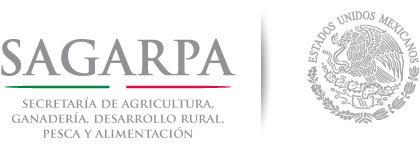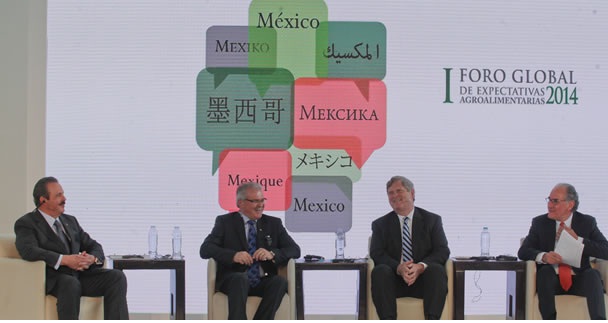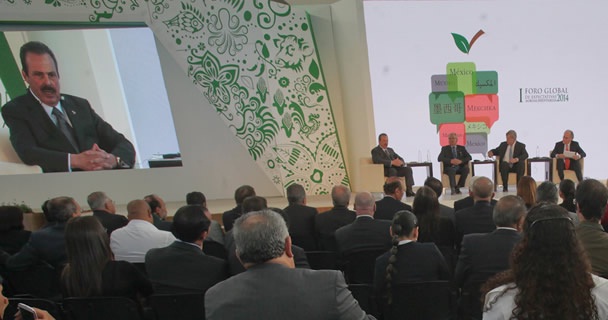
Mexico City, May 19, 2014
- Participants in the 2014 Global Forum on Agro Food Expectations included the head of SAGARPA, Enrique Martínez y Martínez, Canadian Minister of Agriculture Gerry Ritz and US Secretary of Agriculture Thomas Vilsack.
- he officials agreed to eliminate barriers, harmonize health and safety protocols and optimize logistics infrastructure at borders to expedite the trade process in a market of roughly one billion dollars per day.
- It is important to work as an integrated bloc to be more sustainably productive, so actions must be defined in order to break down some of the barriers and streamline processes in trade flows and exchange: Thomas Vilsack
- Trade in agri-food products is a central axis in the economic development of the three countries, so this meeting is important in order to have a constructive dialogue and define global strategies: Gerry Ritz

Eliminating bureaucratic barriers, harmonizing health and safety protocols and optimizing logistics infrastructure at borders to expedite the trade process in a market of about one billion dollars a day, are some of the strategic issues to be developed and rekindled between Mexico, Canada and the U.S.
This was made evident by the participation of the Ministers of Agriculture of Mexico, Enrique Martínez y Martínez; Canada, Gerry Ritz, and the United States, Thomas Vilsack, in the panel entitled "Integration of agro-industrial markets in North America: Challenges and Opportunities", within the First Global Forum on Agro Food Expectations.
In the context of the 20th anniversary of the signing of the North American Free Trade Agreement (NAFTA), the ministers of this trading bloc agreed on the importance of strengthening scientific and technological cooperation as key elements to meet the challenge of producing more food in a framework of sustainability of natural resources.
During the panel, which was moderated by the President of IQOM Inteligencia Comercial, Herminio Blanco Mendoza, Secretary Martinez y Martinez stated that conditions are ripe for an open dialogue to strengthen alliances between the three partners to become more productive and competitive in a globalized market.
He noted that progress is being made in streamlining procedures, improving agri-food trade logistics and strengthening health and safety systems as well as in the exchange of knowledge and technological innovation to seize the opportunity presented by new markets in the European Union and the Trans-Pacific Partnership, in Asian countries
He highlighted the Government of Mexico’s new vision and the work being carried out with the participation of all stakeholders in the field to foster structural reform that will bolster production and productivity, with an approach based more on the country's strengths, such as horticulture and livestock production.
He urged the ministers of Canada and the United States to assess the convenience of working in productive seasonal cycles by region –that is, productive management that takes into account climates at the continental level–, in order to capitalize on agri-food production and trade and create new market niches.
The Secretary of the United States Department of Agriculture, Thomas Vilsack, noted the importance of working as an integrated bloc in order to be more sustainably productive.
He spoke in favour of defining actions that lead to breaking down certain barriers, adapting rules and streamlining processes and trade flows, since this sector is a generator of jobs, foreign revenue and development.
He stressed that to meet the challenges of climate change and its effects on agriculture, reduced handling of chemicals and dwindling natural resources, we must turn to science to improve food production, safely, and make biotechnology a tool that helps face the challenge of feeding over nine billion people in the coming years.
In turn, the Minister of Agriculture and Agri-food Canada, Gerry Ritz, said that trade in agri-food products is a central axis in the economic development of the three countries, so this meeting is important in order to have a constructive dialogue and define global strategies
He explained that on the issue of genetically modified organisms, Canada is working closely with international institutions to leverage biotechnology resources in the production of enhanced seeds that are resistant to the scourge of climate change and infestations.
Both officials recognized the importance of establishing agreements on labour migration issues, as this accounts for a significant flow of workers in the agricultural sector, both in terms of harvests as well as in the operation of production systems.